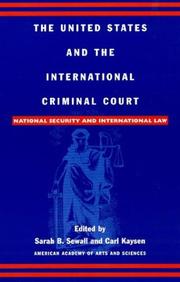| Listing 1 - 4 of 4 |
Sort by
|

ISBN: 0742501345 0742501353 9780742501355 9780742501348 Year: 2000 Publisher: Lanham, MD : Rowman & Littlefield Publishing,
Abstract | Keywords | Export | Availability | Bookmark
 Loading...
Loading...Choose an application
- Reference Manager
- EndNote
- RefWorks (Direct export to RefWorks)
A growing international consensus supports the idea of holding individuals responsible for the most egregious violations of human rights such as genocide. This consensus lies behind the recent efforts to create an International Criminal Court (ICC). The United States, however, has refused to support the ICC, citing concerns that the Court may pose a threat to national security. This volume brings legal, historical, military, and political perspectives to an examination of U.S. concerns about the ICC. The contributors assess not only the potential national security risks that would be associated with a functioning ICC, but also the potential costs to U.S. security that may result from opposing the Court's creation.
International criminal courts --- International offenses --- National security --- Criminal jurisdiction --- International Criminal Court --- International crimes. --- International criminal courts. --- International crimes --- Homeland defense --- Homeland security --- Crimes, International --- International crime --- International Criminal Court. --- U.N. International Criminal Court --- United Nations. --- ICC --- CPI --- Cour pénale internationale --- Corte Penal Internacional --- Internationella brottmålsdomstolen --- Pengadilan Pidana Internasional --- Kokusai Keiji Saibansho --- Mezhdunarodnyĭ ugolovnyĭ sud --- Međunarodni kazneni sud --- Międzynarodowy Trybunał Karny --- Maḥkamat al-Jināʼīyah al-Duwalīyah --- Guo ji xing shi fa yuan --- 国际刑事法院 --- Samnakngān ʻAyakān Sān ʻĀyā Rawāng Prathēt --- Tribunal Penal Internacional --- Criminal courts --- International courts --- Complementarity (International law) --- Crime --- Uluslararası Ceza Mahkemesi --- UCM --- National security - United States --- Criminal jurisdiction - United States
Book
Year: 2016 Publisher: Maxwell Air Force Base, Alabama : Air University Press, Air Force Research Institute,
Abstract | Keywords | Export | Availability | Bookmark
 Loading...
Loading...Choose an application
- Reference Manager
- EndNote
- RefWorks (Direct export to RefWorks)
Air power --- Civilian war casualties --- Combatants and noncombatants (International law) --- War victims --- Harm reduction --- Government policy --- Prevention. --- History. --- Moral and ethical aspects. --- United States. --- Rules and practice. --- United States --- Military policy
Book
Year: 2016 Publisher: Maxwell Air Force Base, Alabama : Air University Press, Air Force Research Institute,
Abstract | Keywords | Export | Availability | Bookmark
 Loading...
Loading...Choose an application
- Reference Manager
- EndNote
- RefWorks (Direct export to RefWorks)
Air power --- Civilian war casualties --- Civilian war casualties --- Combatants and noncombatants (International law) --- War victims --- Harm reduction --- Government policy --- Prevention. --- Government policy --- History. --- Moral and ethical aspects. --- Government policy --- United States. --- Rules and practice. --- United States --- Military policy --- Moral and ethical aspects.
Book

ISBN: 9781685855048 1685855040 Year: 2023 Publisher: Boulder
Abstract | Keywords | Export | Availability | Bookmark
 Loading...
Loading...Choose an application
- Reference Manager
- EndNote
- RefWorks (Direct export to RefWorks)
When should the United States cooperate with others in confronting global problems? Why is the U.S. often ambivalent about multilateral cooperation? What are the costs of acting alone? These are some of the timely questions addressed in this examination of the role of multilateralism in U.S. foreign policy. The authors isolate a number of factors that help to explain U.S. reluctance to commit to multilateral cooperation. They then analyze recent policy in specific areas—e.g., the use of force, peacekeeping, arms control, human rights, the United Nations, sanctions, international trade, environmental protection—probing the causes and consequences of U.S. decisions to act alone or opt out of multilateral initiatives. A concluding chapter underscores the point that increasingly pressing transnational problems may require the U.S. to reform its policymaking structures and to reconsider longstanding assumptions about national sovereignty and freedom of action.
| Listing 1 - 4 of 4 |
Sort by
|

 Search
Search Feedback
Feedback About UniCat
About UniCat  Help
Help News
News